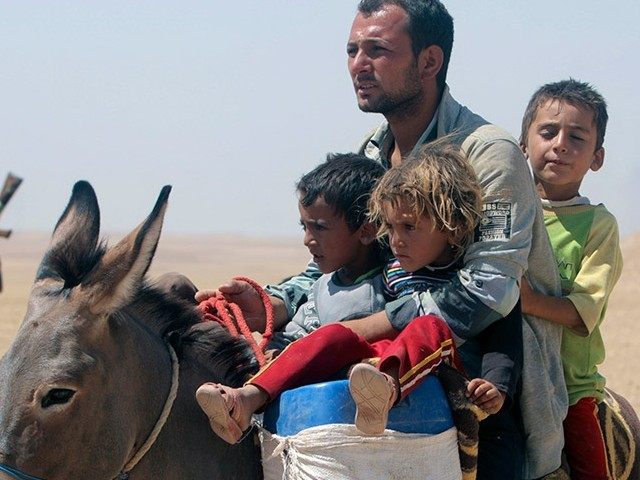The Yezidis are holding worldwide rallies and Memorial Services tomorrow in Oldenberg, Germany; on August 2nd in Lalish, Iraq (the Yezidi spiritual heartland), and in France; and on August 3rd in Geneva, Armenia, Berlin, and in cities in Sweden, Turkey, Iraq, Syria, and the United States (Lincoln, Nebraska; Houston, Texas; and perhaps Buffalo, New York).
On August 2nd in Lincoln, Nebraska, the Yezidi community is sponsoring an Art Walk with prizes for the best art work that illustrates their people’s historical and contemporary story. Houston-based Yezidis are holding a Remembrance Service at the University of Houston.
Yezidis are remembering and protesting the seventy four genocides that their people have endured in the Middle East. These massacres have taken place from the seventh century on and were perpetrated by Arab Muslims, Mongols, Persians, Kurds, Turks, Ottomans, etc.
August 3, 2015 marks the one-year anniversary of the most recent of these genocides—perpetrated by the Islamic State (ISIS or ISIL); it is a 21st century disaster that remains ongoing.
According to Yezidi-American activist Gulie Khalaf, who is also the treasurer for Yezidis International, in an interview, ISIS has “killed over 3,000 civilians, including women, children, elderly, and the disabled. They have kidnapped at least 5,000 civilians, most women and girls, who were targeted for sexual enslavement. After being taken from their parents, many young boys were brainwashed and trained as child soldiers to fight for ISIS’s jihadist objectives. In some cases, ISIS jihadists buried Yazidis alive or burned them inside their religious temples. ISIS destroyed over 20 Yazidi shrines and religious sites and, with explosives, forcefully displaced 350,000 Yazidis in an attempt to permanently ethnically-cleanse them from their traditional homeland as a way of discouraging the community from ever attempting to return.”
According to Murad Ismail, co-founder of Yazda, a global Yazidi Organization, and another interviewee, “Our hostages are still living under terrible conditions. Girls and women are being sexually violated on an hourly basis. ISIL wants to destroy our people and our culture. And the international community has allowed this to happen.”
Some Yazidis have escaped. Some have been rescued. Many more have been murdered. According to Ismail, the Yazidis who were brought to Houston and Lincoln were people who had worked in some capacity for the American government or military. Once settled, they brought their relatives; their neighbors gravitated to where Yazidi community existed.
However, many Yazidis still remain trapped in refugee camps or remain in ISIS’s clutches. Both Yazidi and Christian girls and women have been taken as sex slaves by ISIS. Many young Yazidi boys have been trained to hate their own people, to study the Qur’an, and to train as warriors. According to today’s Daily Mail, one four-year-old Yazidi boy had to learn Sharia law and was “given a sword to behead his own mother.” (Amazingly, both he and his mother escaped.)
Last week, The Telegraph published yet another heartbreaking interview with Rozin Khalil Hanjool, a 17-year-old Yazidi girl living in England. Rozin has launched a Change.org petition on behalf of the captive girls which now has 110,000 signatures. Hanjool wants the UK government to rescue their girls.
According to Gulie Khalaf, “governments might not yet recognize this officially as genocidal, but we want August 3rd as a remembrance day for the sake of those who were attacked and who passed away.”
Khalaf also shared some troubling information with me about American do-gooders who take money and promise to help rescue specific Yazidis by name—and then disappear or present other Yazidis with the exact same name but who are unknown to their anguished relatives. She says, “We are pursuing one particular man who has promised to return our money but, if he does not, we may not be able to afford to take him to court. We also do not wish to be sued ourselves.”
According to an article in Rudaw, a Kurdish media network, a claim was made about some Evangelical Christians handing out Bibles to traumatized Yazidis, praying with them, telling them that Jesus can save them, and “asking the refugees to convert to Christianity in order to start a new life in the West.”
However, according to Sinjari-born Murad Ismail, the co-founder of Yazda, “such allegations against Christians have been exaggerated in the media.” Ismail knows of one, maybe two such cases. Otherwise, he says, “Christians are helping us enormously. There is a lot of corruption in the programs provided to refugees, not all the money gets into the hands of the refugees, but organizations have a huge overhead.”
Recently, in Copenhagen, I interviewed Hans Erling Jensen, the International Director of the Hatune Foundation. They are rescuing mainly Christian but also Yazidi girls and women, bringing them to Europe, and trying to help them deal with their agonizing traumas and losses.
Murad Ismail explained that the American air strikes and food drops over Sinjar last year were very successful. Otherwise, “50,000 Yazidis would have been killed or enslaved.” However, after last August, there were opportunities to rescue hostages in Kocho and Talafar but this did not happen. The international community failed their obligation to stop genocide in the 21st century.
Since President Obama has a way with the UN Security Council and is committed to multi-lateral actions: Why not persuade the world to stop genocide in the 21st century? We failed the former Yugoslavians, the Rwandans, the Sudanese, the Nigerians, the Iranians—and the Yezidis are certainly not the only endangered peoples today, but why not start somewhere? Let’s do it. Let’s do something noble and important and in doing so, we will be fighting back against barbarism and misogyny.

COMMENTS
Please let us know if you're having issues with commenting.